SAARC Notes Handwritten (Download in PDF)
SAARC Basic Information:
SAARC Stand for:
South Asian Association for Regional Cooperation
SAARC established: SAARC Notes
8 December 1985
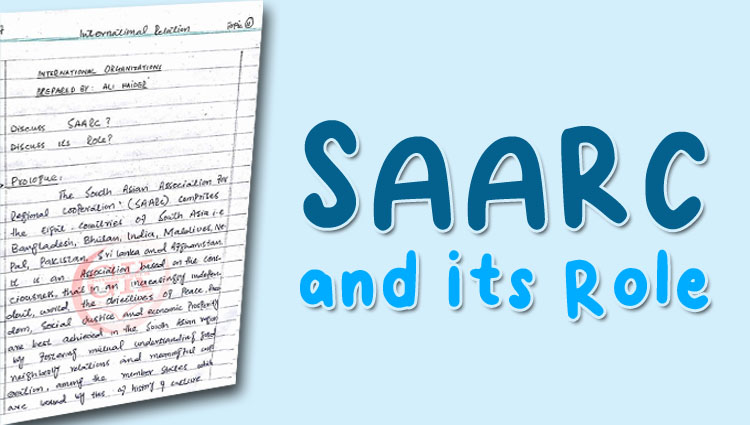
SAARC Stand for:
South Asian Association for Regional Cooperation
SAARC established: SAARC Notes
8 December 1985
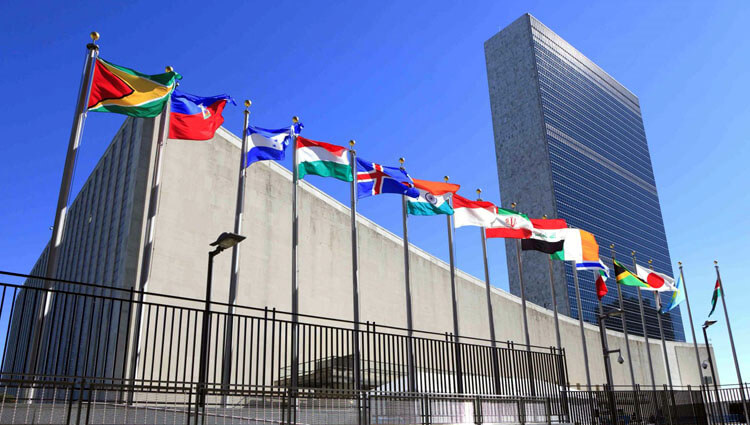
By: Iram Farooq Rana
The United Nations (UN), an international body, possesses a distinguished role by formulating a founding charter of human rights. It is dubbed as the champion of “human rights” which seems like a big joke on account of its passive role. Human rights have been mentioned seven times in the United Nations charter as its key purpose and guiding principle. But Alas! it is performing the role of a dumb and blind player in defending and protecting human rights.
The whole world is witnessing the bitter reality of violation of human rights in Syria, Palestine, Iraq, Burma and Kashmir. Human rights are rights inherent to all human beings, regardless of race, sex, nationality, ethnicity, language, religion or any other status.
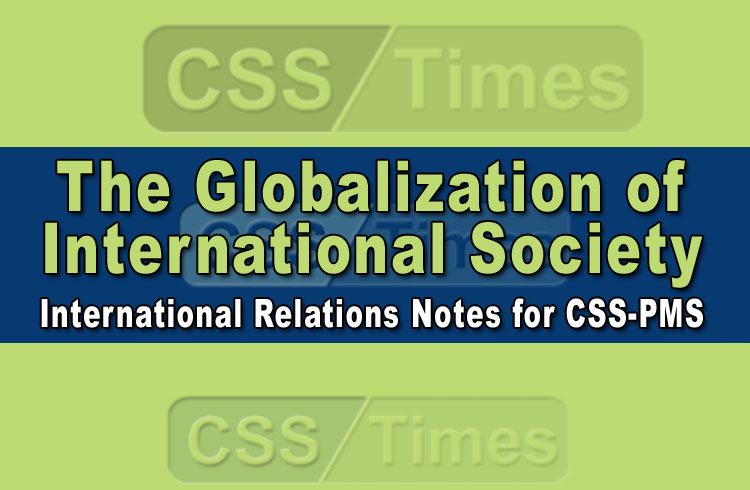
The spread of European political control beyond Europe which began in the late fifteenth century and only came to an end in the early twentieth century proved to be an expansion not only of European imperialism but also, later, of international society Indeed, the history of European imperialism and the ‘globalization of international society^ are fundamentally intertwined. The history of modem Europe is—in very significant part—a history of political and economic rivalry, particularly war between sovereign states, and subsequent expansion into and engagement with the non-European world. European rivalries were conducted wherever European ambitions and power could be projected—i.e. eventually on a global scale. During this period, the logic of capitalism meant that European states entered into competition with each other to penetrate and control economically desirable and militarily useful areas in other parts of the world. To an important extent, then, the histories of the European and non-European worlds are fundamentally intertwined in ways not always captured by traditional understandings of the European ‘society of states’
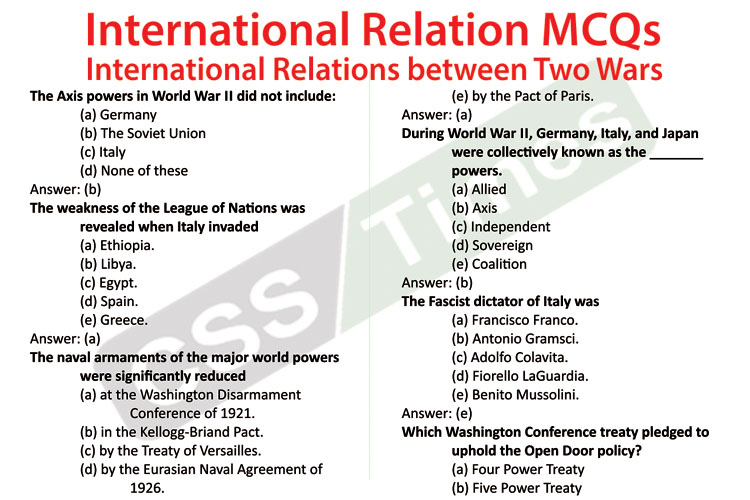
The Axis powers in World War II did not include:
(a) Germany
(b) The Soviet Union
(c) Italy
(d) None of these
Answer: (b)
The weakness of the League of Nations was revealed when Italy invaded
(a) Ethiopia.
(b) Libya.
(c) Egypt.
(d) Spain.
(e) Greece.
Answer: (a)
The naval armaments of the major world powers were significantly reduced
(a) at the Washington Disarmament Conference of 1921.
(b) in the Kellogg-Briand Pact.
(c) by the Treaty of Versailles.
(d) by the Eurasian Naval Agreement of 1926.
(e) by the Pact of Paris.
Answer: (a)
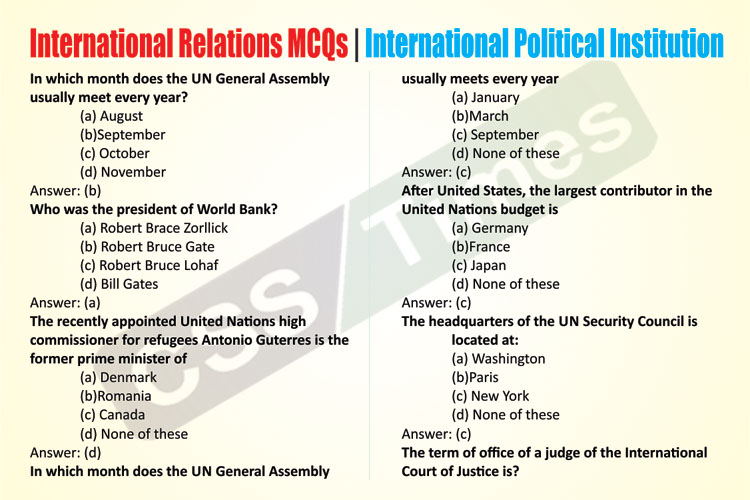
In which month does the UN General Assembly usually meet every year?
(a) August
(b)September
(c) October
(d) November
Answer: (b)
Who was the president of World Bank?
(a) Robert Brace Zorllick
(b) Robert Bruce Gate
(c) Robert Bruce Lohaf
(d) Bill Gates
Answer: (a)
The recently appointed United Nations high commissioner for refugees Antonio Guterres is the former prime minister of
(a) Denmark
(b)Romania
(c) Canada
(d) None of these
Answer: (d)
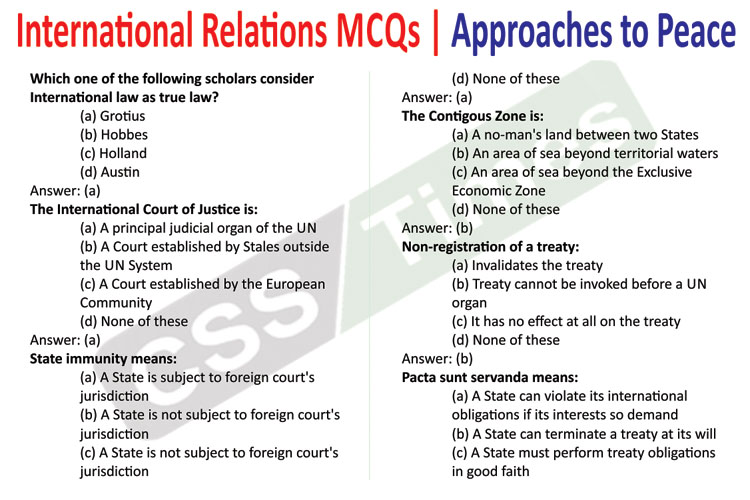
Which one of the following scholars consider International law as true law?
(a) Grotius
(b) Hobbes
(c) Holland
(d) Austin
Answer: (a)
The International Court of Justice is:
(a) A principal judicial organ of the UN
(b) A Court established by Stales outside the UN System
(c) A Court established by the European Community
(d) None of these
Answer: (a)
State immunity means:
(a) A State is subject to foreign court’s jurisdiction
(b) A State is not subject to foreign court’s jurisdiction
(c) A State is not subject to foreign court’s jurisdiction
(d) None of these
Answer: (a)
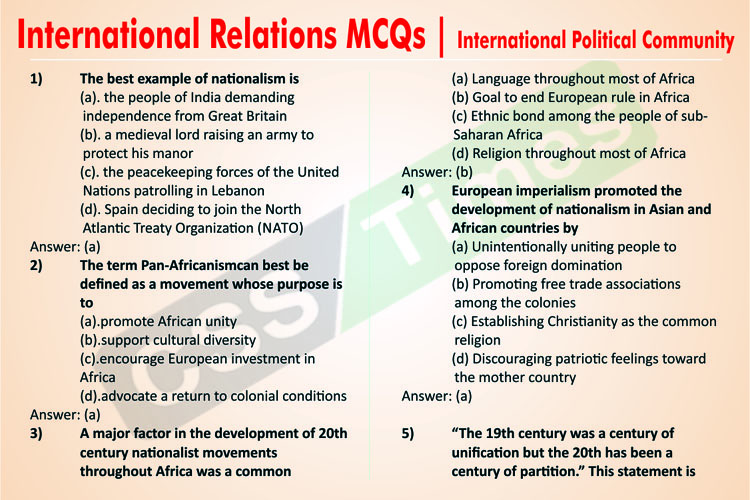
1) The best example of nationalism is
(a). the people of India demanding independence from Great Britain
(b). a medieval lord raising an army to protect his manor
(c). the peacekeeping forces of the United Nations patrolling in Lebanon
(d). Spain deciding to join the North Atlantic Treaty Organization (NATO)
Answer: (a)
2) The term Pan-Africanismcan best be defined as a movement whose purpose is to
(a).promote African unity
(b).support cultural diversity
(c).encourage European investment in Africa
(d).advocate a return to colonial conditions
Answer: (a)
3) A major factor in the development of 20th century nationalist movements throughout Africa was a common
(a) Language throughout most of Africa
(b) Goal to end European rule in Africa
(c) Ethnic bond among the people of sub-Saharan Africa
(d) Religion throughout most of Africa
Answer: (b)
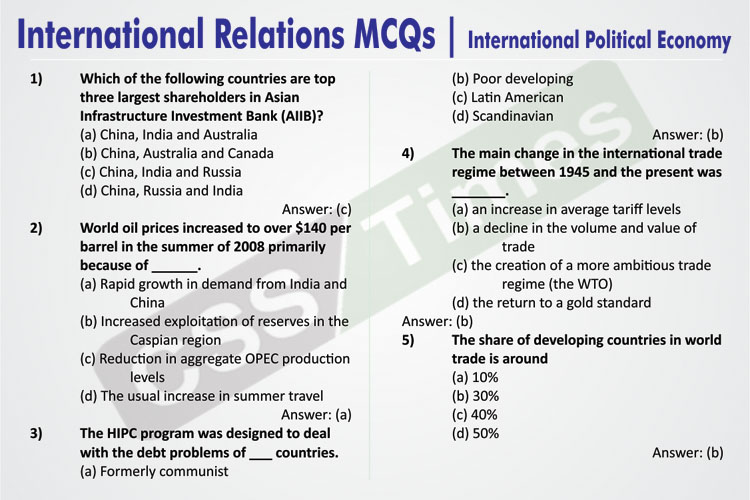
1) Which of the following countries are top three largest shareholders in Asian Infrastructure Investment Bank (AIIB)?
(a) China, India and Australia
(b) China, Australia and Canada
(c) China, India and Russia
(d) China, Russia and India
Answer: (c)
2) World oil prices increased to over $140 per barrel in the summer of 2008 primarily because of ______.
(a) Rapid growth in demand from India and China
(b) Increased exploitation of reserves in the Caspian region
(c) Reduction in aggregate OPEC production levels
(d) The usual increase in summer travel
Answer: (a)
3) The HIPC program was designed to deal with the debt problems of ___ countries.
(a) Formerly communist
(b) Poor developing
(c) Latin American
(d) Scandinavian
Answer: (b)
4) The main change in the international trade regime between 1945 and the present was _______.
(a) an increase in average tariff levels
(b) a decline in the volume and value of trade
(c) the creation of a more ambitious trade regime (the WTO)
(d) the return to a gold standard
Answer: (b)
5) The share of developing countries in world trade is around
(a) 10%
(b) 30%
(c) 40%
(d) 50%
Answer: (b)
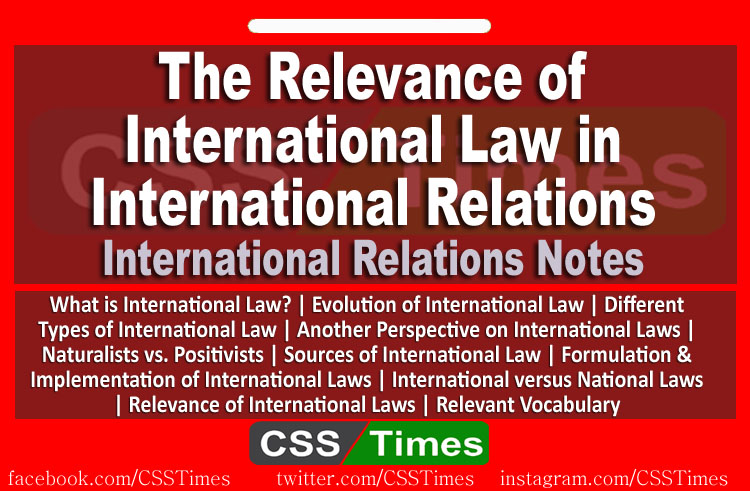
The Relevance of INTERNATIONAL LAW in INTERNATIONAL RELATIONS
International laws are rules which relate to the functioning of individuals, institutions and states in the international arena. International law has various ingredients including general principles of law and justice, which are equally suited to regulating the conduct of individuals, organizations within a state and states themselves.
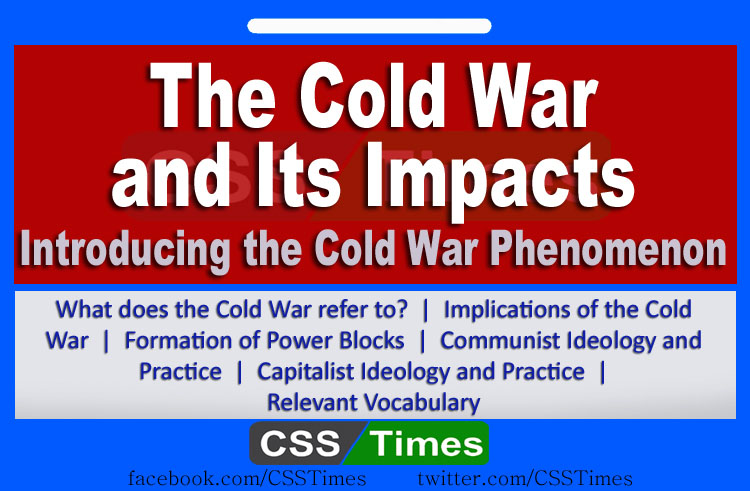
The Cold War refers to the phenomenon that overshadowed world politics from the end of WWII until the fall of the former Soviet Union. It is one of the most significant events from the perspective of students of international relations.
The term Cold War signifies the state of affairs in which bitter relations, hostility and confrontation between the two post-WWII superpowers (US and USSR). The Cold War did not result in outbreak of war between the superpowers.
The Cold War did result in an arms race, diplomatic confrontation, proxy warfare, ideological competition which engulfed the entire world order. The Cold War resulted in formation of eastern and western power blocks and corresponding alliances and institutions under the Communist and Capitalist power blocks.